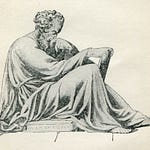“SOCRATES: This fine speaking of yours about Homer, as I was saying a moment ago, is not a skill at all. What moves you is a divine power. …
For all good epic poets recite all that splendid poetry not by virtue of a skill, but in a state of inspiration and possession. The same is true of good lyric poets as well. … Or don’t you think I’ve got it right, Ion?
ION: By Zeus, I think you have. Somehow or other your words touch my soul, Socrates, and I do believe good poets interpret these messages from the gods for us by divine dispensation.
SOCRATES: So you rhapsodes in turn interpret the words of the poets, don’t you?
ION: You’re right in that, too.
SOCRATES: So your role is to be interpreters of interpreters?
ION: Surely.” (Plato, Ion, 533b-535a)














Plato on the nature of poetry